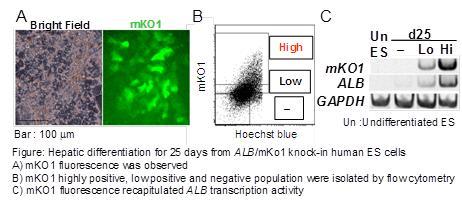
Kahoko Umeda, Keiichiro Suzuki, Taiji Yamazoe, Nobuaki Shiraki, Yuichiro Higuchi, Kumiko Tokieda, Kazuhiko Kume, Kohnosuke Mitani, Shoen Kume (2012)
Albumin gene targeting in human embryonic stem cells and induced pluripotent stem cells with helper-dependent adenoviral vector to monitor hepatic differentiation. Stem Cell Res. 2013 Mar;10(2):179-94.
The liver plays a central role in detoxification of drugs. Human primary hepatocytes are valuable for assessing drug toxicity and testing drug kinetics but these applications are impeded from limited availability and differences between samples. Therefore, human embryonic stem (ES) , induced pluripotent stem (iPS) cells derived hepatocyte could be alternative resource. We have previously established a procedure in which ES cells are sequentially induced in vitro into the definitive endoderm, and liver (Shiraki et al., 2008) and procedure with synthesized basement membrane (sBM) (Shiraki et al., 2011).
We performed knock-in of a monomeric Kusabira Orange (mKO1) cassette in the albumin ( ALB ) gene, in human ES, iPS cells, with the use of the helper-dependent adenovirus vector. The mKO1 knock-in ( ALB /mKo1) human ES/iPS cells were used to visualize hepatic differentiation in vitro . mKO1 reporter expression recapitulated endogenous ALB transcriptional activity. ALB /mKo1 high positive (Hi) population isolated by flow cytometry was confirmed to be enriched with ALB mRNA. Expression profile analyses revealed that characteristic hepatocyte genes and genes related to drug metabolism and many aspects of liver function were highly enriched in theALB /mKo1 [Hi] population. Our data demonstrate that ALB /mKo1 knock-in ES/iPS cells are valuable resources for monitoring in vitro hepatic differentiation, isolation and analyses of ES/iPS cells-derived hepatic cells that actively transcribing ALB . These knock-in ES/iPS cell lines could provide further insights into the mechanism of hepatic differentiation and molecular signatures of the hepatic cells derived from ES/iPS cells.
